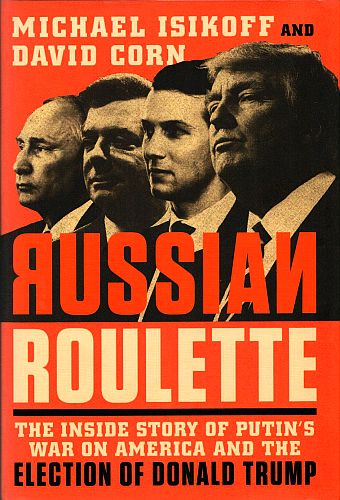

| RUSSIAN ROULETTE The Inside Story of Putin's War on America and the Election of Donald Trump Michael Isikoff David Corn New York: Hachette Book Group, March 2018 |
Rating: 5.0 High |
|||
| ISBN-13 978-1-53872-875-8 | ||||
| ISBN 1-53872-875-3 | 339pp. | HC | $30.00 | |
Following in the wake of numerous books critical of Trump — notably Luke Harding's Collusion and David Cay Johnston's It's Even Worse than You Think — this major work by Michael Isikoff and David Corn pulls together the details of Trump's campaign and some events of his first year in office as they relate to putative connections with Putin's regime. The account unfolds mostly in chronological order; the exception is the earliest portion of it, where the relevant events are less well documented — especially those that took place in Russia.
The tale begins with the November 2013 Miss Universe pageant in Moscow's Crocus City Hall. Seventeen years before, Trump had become a co-owner of the pageant, partnering with the NBC television network. It burnished his image as a playboy and international jet-setter.1 But being able to hold the 2013 contest in Russia had another benefit: a chance to form an association with the country's autocratic president, Vladimir Putin. Trump had long sought such a bond, since Putin's approval was required for the hotels and other projects Trump wanted to build or manage there.
Putin failed to show that year, pleading prior commitments. His absence caused Trump a good deal of angst.2 But the pageant went well and Trump made contact with several well-connected officials, so the trip was mostly a success.
Over the next few years, Trump's associates kept up these contacts. When the campaign began, he named some of them, such as Carter Page, to his campaign staff. Their prior ties to Putin's increasingly aggressive regime raised eyebrows in many quarters — but never, it seems, for anyone in Trump's orbit.
The outlines of the rest of the story are well known. Trump and his campaign staff continued to flatly deny any Russian connection. In Trump's case, these disclaimers were transparently bogus because his business interests in Russia were matters of public record thanks to his own statements. The phrases "witch hunt" and "fake news" were thrown around a lot, as is typical with the prevaricator-in-chief.3 But evidence continues to pile up, even if much of it is not known (yet) to the public.
Isikoff and Corn, both veteran journalists, have produced a thorough and even-handed account not only of the Trump campaign but of Hillary Clinton's as well. They provide, for example, the most detail I've seen on how John Podesta's email account was penetrated. It is well documented, although the chapter-by-chapter notes are actually more like a list of sources. I noticed only a few grammar goofs and one index error. Russian Roulette is a good complement to Luke Harding's Collusion. Full marks, and I rate it a keeper.
With the margin of victory so slender, any element of the race could have been the decisive factor: Clinton's own messaging problems, her ad buys, the decisions [on] where to campaign and deploy resources in the final weeks, her inability to hold on to a greater number of Sanders voters, her self-created email server problem, Comey's last-minute revival of that controversy, and much more—including the Russian hacks, the Wilileaks dumps, and Putin's covert social media blitz. – page 275 |

 To contact Chris Winter, send email to this address.
To contact Chris Winter, send email to this address.